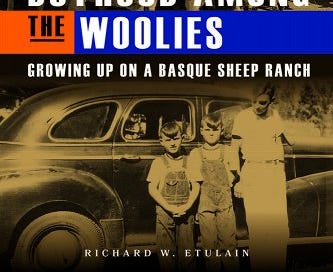'Boyhood Among the Woolies': Pacific Northwest history
Richard W. Etulain relives his youth on a Washington sheep ranch.
This post contains an affiliate link or links. If you use a link to buy a book, I may earn a small commission. You can find all the books that have been featured in this newsletter in my Bookshop store.
Some years ago, when I was books editor at a newspaper, historian Richard W. Etulain emailed out of the blue to offer his services as a freelance book reviewer. We worked together on several pieces; I enjoyed them and learned quite a bit from it. So when he sent me a copy of his new book “Boyhood Among the Woolies: Growing Up on a Basque Sheep Ranch,” I was intrigued.
I had vaguely heard of Basques, but hadn’t met any until a trip to northern Nevada, where my then-boyfriend (a former Nevada resident) said that many Basque sheep herders lived in the area and took me to a Basque restaurant. We ate family style at long wooden communal tables; I don’t remember exactly what we had, but it was all delicious. That was the extent of my knowledge of Basques in America. Until Etulain’s book.
Etulain’s father, Sebastian Etulain, left the Basque region between Spain and France for America in 1921 at the age of 19, partly to escape being drafted into Spain’s Rif War in north Africa. He made his way to Yakima, Washington, where he had two brothers already immersed in sheep ranching. Sebastian had already worked on a farm, so he was sent out with the “woolies” on his own within days.
By the time his youngest son, Richard, arrived in 1938, Sebastian Etulain had his own sheep ranch in Washington’s Adams County. Richard, who goes by Dick, had the kind of childhood that seems like something out of an old-time reader: See Dick dig, and dig, and dig. See Dick and brother Ken raft around the lake next to the pigpen. See the hired man milk the cows. See Dad weld. See Dick play on the hay bales. See the baby lambs! It’s time to feed them and the ewes.
The Etulain boys (there were three) spent weekends in town — Ritzville, 25 miles away, where they went to the library and the pool and music lessons mandated by their mother. They spent summers in Idaho.
Over the course of Etulain’s childhood, his father moved from sheep ranching to cattle ranching, then to hay growing, before finally leaving agriculture to run a motel in Moses Lake, Washington, where he lived out his final years.
In recalling his childhood and adolescence, Etulain provides a richly detailed slice of Pacific Northwest ranching history: He devotes chapters to school, church, herders and hired men, lambing season, shearing. Even the sheepdogs get a turn in the spotlight.
Though Etulain was a committed “town kid” by high school, The Ranch left a lifelong imprint, including upon his perspective as a historian. But it wasn’t until a student confronted him about favoring the rural West in a U.S. history course he was teaching that he began to acknowledge his biases. From then on, he pursued a more complex, inclusive interpretation of the story of the American West.
No longer, for example, would it be a pioneer story largely about men but now also about farm and ranch wives, ethnic immigrants, minority workers and owners, and a post-1900 history. Ambivalent and agonizing passages about ranchers who overgrazed their pastures and used too many dangerous insecticides also worked their way into my narrative. And, after further foot dragging, I had to admit that some of my beloved Populists were blind to their own prejudices, unable to see that a few of their problems were self-inflicted.
Etulain is an astonishingly prolific author of books about the American West. “Boyhood Among the Woolies” is a satisfyingly personal addition to that collection.




Thanks for this review; this looks like an extremely interesting book. I don't know if Etulain addresses Basque culture, but Basque dance is it's own culturally specific dance form, at once elegant and exuberant.